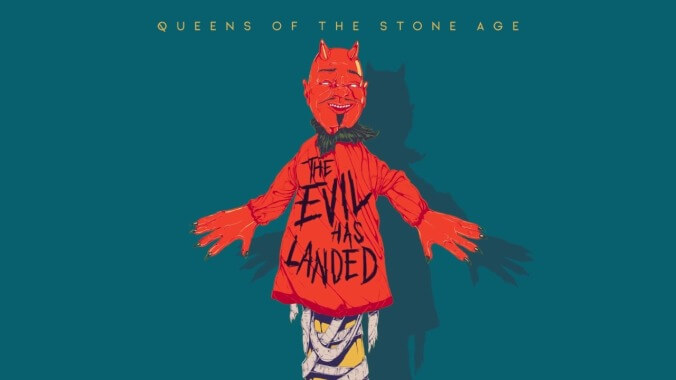Queens Of The Stone Age cut loose on Villains

Next year will mark 20 years since the first Queens Of The Stone Age album. The success it’s garnered over that time places the band into an esteemed category, where festival headlining slots and radio spins are a given with each new album cycle. But it’s worth remembering that this wasn’t always the case. Queens was born out of the hazy stoner-rock leader Josh Homme made with his previous project, Kyuss, creating a similar cult around its self-titled debut and Rated R. It wouldn’t be until Songs For The Deaf, with “No One Knows” and “Go With The Flow,” that the band had its first brush with bona fide hits; on Lullabies To Paralyze, it struck gold again with the smash “Little Sister.” By 2005, QOTSA had become mainstays on the charts and MTV, toured the world, welcomed contributors like Foo Fighters’ Dave Grohl and ZZ Top’s Billy Gibbons into the fold, and even had Will Ferrell join in on cowbell on Saturday Night Live. Out of the Southern California desert bloomed one of hard rock’s most exciting—and broadly palatable—institutions.
But arguably, the most important stretch of its career came between albums five and six. Released in 2007, Era Vulgaris was a disappointment by every metric. None of its singles cracked the top 20, and reviews were surprisingly tepid. A six-year recording break followed, during which Homme dabbled in the high-profile side project Them Crooked Vultures and dealt with health issues that left him bedridden, depressed, and close to retiring from music altogether. It was fair to wonder whether Queens Of The Stone Age had peaked. But with 2013’s …Like Clockwork, the band didn’t just rebound; it jumped to a whole new plane. Not only was it QOTSA’s first No. 1 album, but it returned the group to radio’s good graces and picked up three Grammy nominations in the process. Inspired in part by Homme’s illness (and echoing its title), there was a workmanlike comfort to the recording, as if Homme were moving on as though the slump of Era Vulgaris had never happened. It felt like he was adopting the “living on borrowed time” philosophy of those who have survived near-death experiences, and applied its swagger to his band.
That restored confidence is all over the new Villains. Having crawled his way to the top, been humbled, then climbed his way back, there is a certain, natural ease to Homme these days. Lead single “The Way You Used To Do” serves as a microcosm for that attitude: It swaggers without the need to prove itself, its loose, playful guitar noodling distinctive enough to qualify as a hook. When Homme lets the music drop away to deliver the titular line, it’s catchy in a way that doesn’t so much announce itself as creep up behind you.
 Keep scrolling for more great stories.
Keep scrolling for more great stories.
